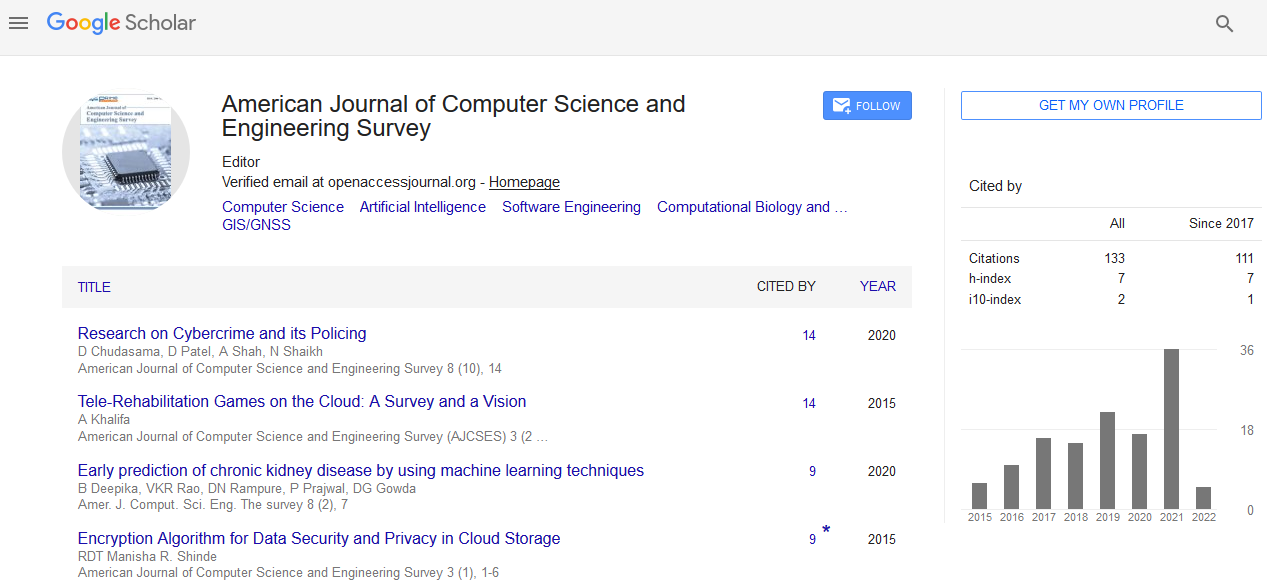Commentary - (2024) Volume 12, Issue 1
Artificial Intelligence: Past, Present, and Future aspects
Finn Alvarez*
Department of Artificial Intelligence, University of St. Gallen, Switzerland
*Correspondence:
Finn Alvarez,
Department of Artificial Intelligence, University of St. Gallen,
Switzerland,
Email:
Received: 28-Feb-2024, Manuscript No. IPACSES-24-19984;
Editor assigned: 01-Mar-2024, Pre QC No. IPACSES-24-19984 (PQ);
Reviewed: 15-Mar-2024, QC No. IPACSES-24-19984;
Revised: 20-Mar-2024, Manuscript No. IPACSES-24-19984 (R);
Published:
27-Mar-2024, DOI: 10.36846/2349-7238.24.12.07
Description
Artificial Intelligence (AI) stands as one of the most
transformative technologies of the 21st century, reshaping
industries, economies, and societies worldwide. This paper
provides an overview of AI, tracing its historical development,
exploring its current applications across various sectors, and
envisioning its future impact on human civilization. From
machine learning algorithms to neural networks, from natural
language processing to robotics, AI continues to advance
at an unprecedented pace, offering both unprecedented
opportunities and daunting challenges. By examining key
milestones, breakthroughs, ethical considerations, and
emerging trends, this paper seeks to elucidate the multifaceted
nature of AI and its implications for the future of humanity.
Artificial Intelligence refers to the simulation of human
intelligence in machines, enabling them to perform tasks that
typically require human cognition, such as problem-solving,
pattern recognition, and decision-making. The quest for AI
dates back to antiquity, but significant progress has been made
in recent decades, fueled by advancements in computing
power, data availability, and algorithmic innovation. Early
Foundations: The roots of AI can be traced back to the mid-
20th century, with pioneers such as Alan Turing, John McCarthy,
and Marvin Minsky laying the theoretical groundwork for
intelligent machines. AI Winter and Resurgence: The field
experienced periods of optimism and disillusionment, known
as AI summers and winters, marked by fluctuations in funding,
interest, and progress. However, recent years have witnessed
a resurgence of interest in AI, driven by breakthroughs in
deep learning, reinforcement learning, and neural network
architectures. Machine Learning and Data Analytics: AI
algorithms analyze vast amounts of data to extract insights,
make predictions, and automate decision-making processes in
diverse domains, including finance, healthcare, and marketing.
Natural Language Processing (NLP): NLP enables computers to
understand, interpret, and generate human language, powering
virtual assistants, chatbots, and language translation services.
Computer Vision: Computer vision algorithms enable machines
to interpret and analyze visual information from images
and videos, driving applications such as facial recognition,
autonomous vehicles, and medical imaging. Robotics and
Autonomous Systems: AI-powered robots and autonomous
systems perform tasks ranging from manufacturing and logistics
to healthcare and space exploration, augmenting human
capabilities and revolutionizing industries. Bias and Fairness:
AI systems may perpetuate biases present in training data,
leading to unfair outcomes and discrimination against certain
groups. Addressing bias and ensuring algorithmic fairness are
critical for building trust and accountability in AI. Privacy and
Surveillance: The proliferation of AI-powered surveillance
technologies raises concerns about privacy infringement,
mass surveillance, and erosion of civil liberties, necessitating
robust regulatory frameworks and ethical guidelines. Job
Displacement and Economic Inequality: Automation driven by
AI threatens to disrupt labor markets, displacing workers from
traditional roles and exacerbating socioeconomic inequalities.
Reskilling, lifelong learning, and social safety nets are essential
for mitigating the adverse effects of AI-driven automation.
Artificial General Intelligence (AGI): The pursuit of AGI, or
human-level intelligence in machines, remains a long-term goal
of AI research, posing fundamental scientific and philosophical
challenges. Explainable AI (XAI): Ensuring transparency and
interpretability in AI decision-making processes is crucial
for building trust, understanding model behavior, and
detecting biases. AI Governance and Regulation: Developing
international norms, standards, and regulations for the ethical
design, deployment, and use of AI is imperative for ensuring its
responsible and beneficial integration into society.
Acknowledgement
None.
Conflict Of Interest
None.
Citation: Alvarez F (2024) Artificial Intelligence: Past, Present, and Future Aspects. Am J Comp Science. 12:07.
Copyright: © 2024 Alvarez F. This is an open-access article distributed under the terms of the Creative Commons Attribution License, which permits unrestricted use, distribution and reproduction in any medium, provided the original author and source are credited.

